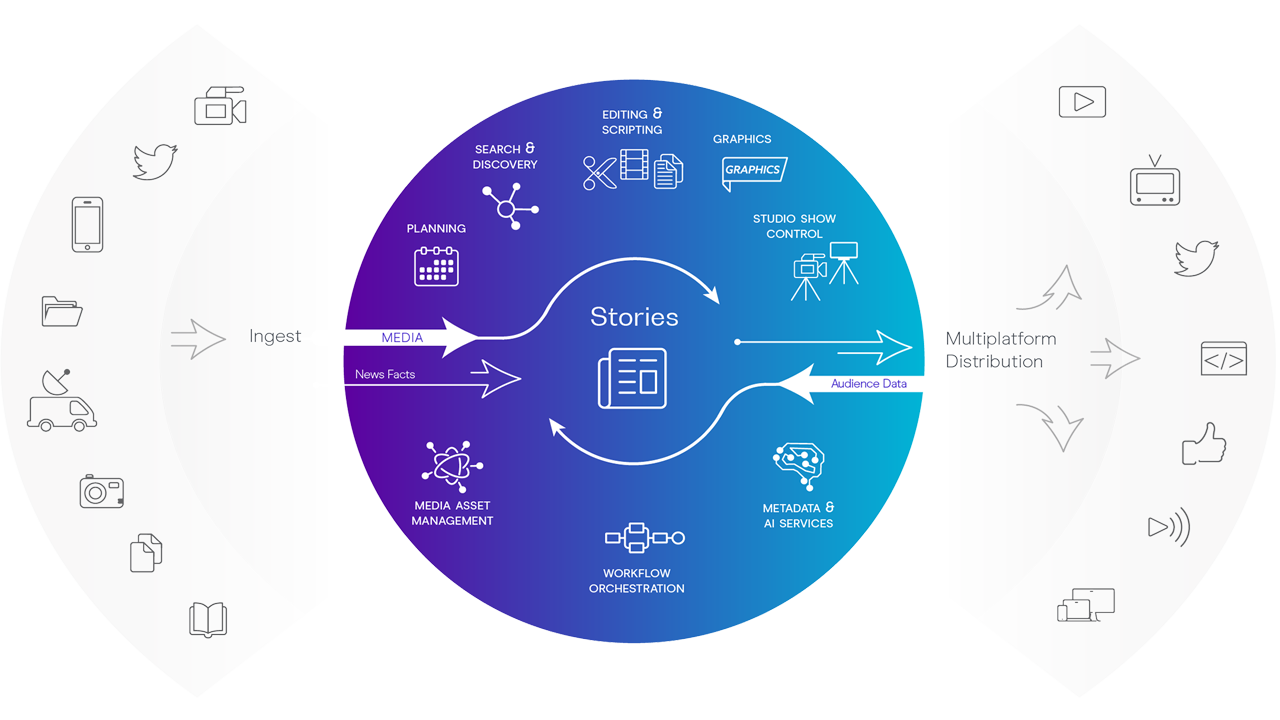Before 2020, the majority of news organizations treated the cloud-based newsroom as an interesting experiment: a technology that might become important in the future, but not necessarily essential part of present-day operations. Too many unknown variables to take into account with a cloud-based newsroom existed, and if the current workflow wasn’t broke, why fix it? Newsrooms and networks, both big and small, were working with a system that they understood. Cloud technology and the virtual newsroom seemed like an ongoing promise that had yet to be fulfilled.
With the onset of COVID-19, moving towards a virtual newsroom was no longer regarded as an ambitious step, but a step for survival. Journalists and film crews found themselves adapting to a remote model, a completely cloud-based newsroom with its own unique set of workflows.

The Virtual Newsroom: Create Anywhere, Together
Now is the perfect time for the adoption of the cloud-based newsroom as we have more ways to cover news. As a result, more events can be included, especially as events happen faster, instantly delivered social media like Twitter and 24-hour news coverage itself.
The traditional news operation strategy — creating stories using a linear approach to programming — grows increasingly less relevant to today’s news consumption. Instead, news organizations take a “story-centric” approach where all resources are focused on creating a story. By following a story-centric approach, the story itself is at the top and everything else is subordinate to it. Tasks like ingest, scripting, audio and video editing, as well as digital versioning and graphics, are all centered around the story.

The Storytelling 360 approach becomes the foundation for the cloud-based newsroom, especially when you look at the ways that news is distributed today. By having all sources, assets and tools clustered around a “story” it is easier to produce multiple, platform-optimized versions because everything is to hand. Without this approach, producing multiple versions would be more expensive and far less efficient. This approach will be at the center of all virtual newsroom operations, a story-centric approach understood and adopted by a majority of newsrooms and technology providers.
Reaping the Benefits of a Virtual Newsroom
What is truly amazing, if not a bit reassuring, about the transition to the virtual newsroom is that it starts with all the resources of a traditional newsroom:
- Newsroom Computer Systems (NRCS)
- News Production System (NPS)
Another benefit, by design, of the virtual newsroom is its ability to be mobile. Your browser essentially works as a standardized portal across individual computing platforms. Pairing mobile apps with browser-based platforms allow news professionals to work on any suitable computing device, wherever they are, at short notice.

The cloud-based newsroom offers incredible agility:
- Smoother operations
- Regular and transparent upgrades with new features
- Less to maintain because this is part of the overall service
- React to new business needs
- Elasticity of the platform means that you can scale up and down according to demand
- Continuous development
- Faster deployment of new systems
All of this culminates in a unified user interface, with the potential of AI used to filter or “curate” incoming feeds and assets, watching for relevant material and offers it as a suggestion for inclusion in the story. It is important to understand that Dalet Pyramid is not a software you put in a newsroom, but it is the newsroom itself, where planning, news production, asset and resource management, playout and multiplatform distribution have been combined into a unified system, capable of conventional news production as well as more mainstream formats like current affairs shows.
Welcome to a World without Borders, a Newsroom that Exists where the Story Happens
Newsrooms are under pressure to produce more and higher quality content. This means more work with smaller budgets available. When this is combined with an unprecedented demand for news (because of unprecedented events) it is clear that a new paradigm is not just “nice to have” but necessary.
The virtual newsroom is that new paradigm. It is completely native to the cloud and inherits the cloud’s beneficial characteristics. In addition the virtual newsroom brings a unified interface, tightly integrated collaboration and new models for newsroom production like digital-first, story-centric workflows and Storytelling 360.

Cloud-based newsrooms represent as big a change as the transition to file-based workflows twenty years ago. But one thing is constant: newsrooms are for telling compelling stories that inform audiences and stir their emotions. That requires human talent and creativity, and that works best in a collaborative environment; and with the cloud-based newsroom, collaboration is the foundation for successful journalism and engaging storytelling.
Now begins the challenge of taking those first steps. What is the obstacle that you need to clear in transitioning to the cloud? Let us offer you options in making this transition effortless. We invite you to take a closer look at cloud-based newsrooms in our white paper, with a look at new technologies dedicated to cloud-first operations and editing suites, to innovative models redefining the news business and operations.

Featured in: Dalet Pyramid | Digital | Digital Newsroom | Digital Transformation | Mobile Journalism | Mobile Newsroom | News Production | Newsroom | Remote Work | Storytelling 360 | Virtual Newsroom |
Raoul Cospen is a Dalet pioneer, and played an integral role in driving the transformation to IT-based, fully integrated newsrooms for the past two decades. He has always felt passionate about being at the heart of newsroom operations, a passion that has driven his vision across multiple roles at Dalet. In his current role, Raoul works closely with Dalet’s customers and partners to define and deliver the most suitable solution to address their media workflow and newsroom requirements.
More Articles By Raoul



